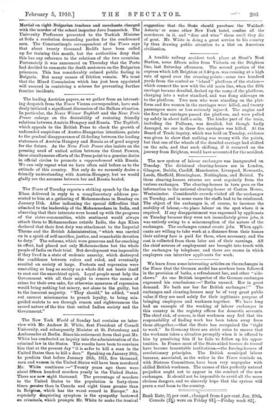We learn from some interesting articles on the exchanges in
the Times that the German model has nowhere been followed in the provision of baths, a refreshment bar, and other "side- shows." As one British inspector of the German exchanges expressed his conclusions :—" Baths unused. Bar in great demand. No bath nor bar for British exchanges ! " The exchanges and clearing-houses may be of very great public value if they are used solely for their legitimate purpose of bringing employers and workmen together. We have long had an example of the working of labour exchanges in this country in the registry offices for domestic servants. The chief risk, of course, is that workmen may feel that the responsibility of finding work has been taken away from them altogether,—that the State has recognised the "right to work." In Germany there are strict rules to ensure that the workman takes a situation promptly when it is offered to him by penalising him if he fails to follow up his oppor- tunities. In France most of the State-aided bourses du travail have become lamentable institutions,—the forcing-houses of revolutionary principles. The British municipal labour bureaux, associated, as the writer in the Times reminds us, with Distress Committees, have been very unpopular with skilled British workmen. The causes of this perfectly natural prejudice ought not to appear in the conduct of the new exchanges. It should not be impossible to avoid all the more obvious dangers, and we sincerely hope that the system will prove a real boon to the country.










































 Previous page
Previous page